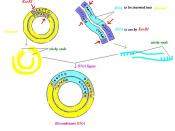In February of 1997 Dolly, the first successful mammalian clone, was born in Edinburgh, Scotland. After the extensive news coverage of this momentous event, the study of genetic engineering and recombinant DNA was thrown into the public spotlight. From that day until this peoples, governments and organizations throughout the world have heatedly discussed the issues surrounding genetic modification and engineering. Over the past several years there has been loud public outcry against the use of such experimental procedures because of the possibility of deadly outcomes. Even though not much is known about genetic engineering, in its many forms, this significant discovery has the boundless potential to improve our lives and must be allowed to progress despite the risks it poses and the public outcry against it.
It is true that we are just on the brink of discovering all of the dangers and benefits of genetic engineering and there is a lot of important information that still remains unknown.
But instead of seeing the immense potential benefits of this mind-boggling discovery, the American public - fed on science fiction novels, horror stories of environmental disaster, a "growing mistrust of science" (Nelkin 1), and the fear of the unknown - automatically reject this god sent breakthrough.
Even though the risks are great, the beneficial possibilities are endless. Genetic engineering should be allowed to progress because of the potential benefits for the human species outweigh the consequences. For example, it will be possible for cows to will be genetically engineered to produce pharmaceuticals in their milk. This means that vaccination shots and pills would become obsolete. Babies could be brought up immune to diseases by simply being fed this milk. Imagine the impact on the quality of life for people who live in third world countries like Somalia. Whole countries could be...


